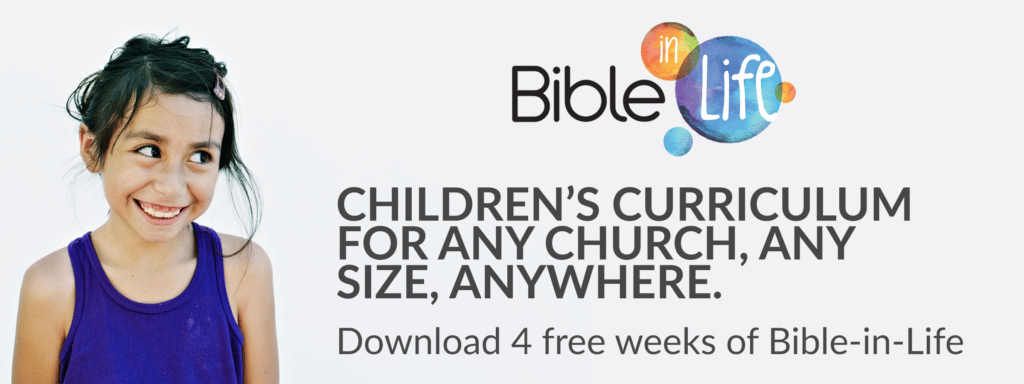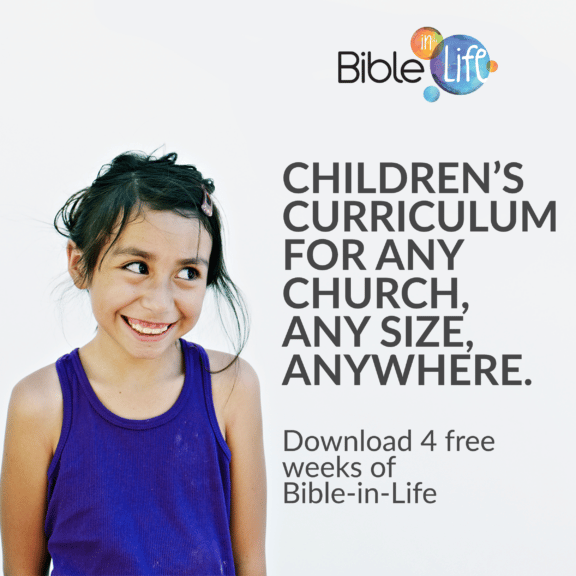THE BASICS FOR LEADERS
Supplies
Background
This story is actually an illustration, but it’s a powerful one. That mustard you glop on your hamburger doesn’t start out as sauce. It’s made from the seeds of a bush that can grow upwards of 10 feet tall. And that plant starts out as a seed so small that, in Jesus’ day, it was the tiniest seed most of his audience had ever seen.
There’s debate about what Jesus meant by “kingdom of God” in this illustration. Did he mean the number of people who would at first follow him compared with the millions to come later, or that his teaching would in time reach many more people? Either way, the point is true.
At first, thousands of people followed Jesus. But by the time he stumbled to the cross, Jesus’ followers were few. And yet, one day, everyone will bow to him.
At one time only his disciples heard all of Jesus’ teaching. Now, anyone with a Bible and the ability to read can know what he told his disciples.
No question about it: when God is there, big things come from small ones. You’ll share that principle with your kids today!
OPENING ACTIVITY
Option 1: Howzitgoin’

Supplies
- Pencils
- Prepared poster
Teach
Before kids arrive, draw a line on a poster. Place a 1 on the left end of the line, a 10 on the right, and a 5 in the middle. As kids arrive, ask them to pencil in their initials on the line.
Say: If this past week was so awful you wish you’d slept through it, place your initials by the 1. If it was a great week you wish you could repeat, put your initials by the 10. Place your initials anywhere on the line that shows how you feel about this past week—except exactly on the 5. That’s because there’s no such thing as a week that’s exactly half good and half bad!
After kids have signed in, give them 30 seconds each to explain why they placed their initials where they did. Be sure to include your own initials and explain your placement on the line. Kids will begin to express themselves more over time—and hearing their stories will help you adapt this lesson to make it relevant to your kids’ lives.
Option 2: 30-Second Service
Form children into pairs. Ask children in each pair to decide who’s the Mustard Seed and who will be the Tomato Seed. Give kids 10 seconds to accomplish the task, and then continue.
Say: Mustard Seeds, in a moment you’ll send your partners off to do a mission project. Not a week-long project in a foreign country; instead, it can take no more than 30 seconds and has to happen right here in this room.
There are three rules:
- The project must be helpful and positive. It’s OK to send your Tomato Seed to hug me and say, “You’re great!” It’s not OK to send him to punch me and say, “You’re ugly!”
- It can’t take more than 30 seconds. You can’t wash all the windows in this room, but you can give someone a 20-second back rub.
- If your Tomato Seed says, “I can’t do that,” think of something else.
Remember, everyone, a service project isn’t about what you want. And it may not be easy! It’s all about helping someone else.
Ready? Mustard Seeds, assign projects now. (pause) Tomato Seeds, get started right . . . now!
What’s Next
After the first round, have Mustard and Tomato Seeds change roles and play again. Then have pairs sit down, facing each other, and discuss:
- Which did you like more—doing the project or assigning one?
- What was hard about your project? What was easy?
- Your 30-second mission was a small thing—how could it have a big impact?
- What’s something in your life that seemed small, but turned out to be big?
Gather kids back together and ask them to share what they learned from talking with their partners.
Say: Today we’re looking at a story Jesus told about a small thing that turned into something big. We’ll see how, with God’s help, that happens to our faith too!


COOL STORY GAME
Towel Time
Place a length of paper towels on the floor. Allow about 18 inches of paper toweling per child. Ask children to line up on the towels facing you.
Say: In a moment, I’ll ask you to line up again on the towels, shortest person to tallest person. The catch: you can’t step off the paper towels. Ready? (You may need to step in and replace the paper towels if they become too torn.)
Have children line up shortest to tallest and then reform in these lineups:
- Youngest to oldest
- Alphabetical order of first name
- Birth dates (earliest in calendar year to latest)
- Shortest hair length to longest
If you have all younger kids, help them line up initially and then ask them to line up in easier ways, such as:
- Color of shirts (darkest to lightest)
- Ages (by years, not by birth dates)
- Eye color (lightest to darkest)
After playing, say: Great job squirming and slithering to stay on the towels! There are lots of ways to arrange things—including us—from smallest to largest. And if we were lining up seeds from smallest to largest, down toward the smallest end would be mustard seeds. They’re tiny—but if you plant them properly, something huge follows. You can get a bush that’s 10 feet tall.
Jesus used that fact in a story he told about mustard seeds. Let’s dive into that story now!
COOL BIBLE STORY
Mustard Tasting

Supplies
- Bible
- 1 bag of pretzels
- Jar of mustard
- Several glasses of water
Teach
Form your children into pairs for this Bible story activity. Ask pairs to sit next to each other.
Say: Jesus’ story about a mustard plant hit home with his audience in a way it doesn’t hit home with us. How many of you live on farms? At least have a garden? And in your garden you have a mustard plant?
To us, the notion of making our own mustard—of caring for the plant, harvesting the seeds, and grinding seeds to mix with other spices and vinegar or wine . . . well, all that seems strange and unknown. But to Jesus’ audience, it was everyday life.
Give each child a pretzel, and then pass around the jar of mustard. Ask children to dip their pretzels in the jar and taste the mustard. (Tell kids there’s no double-dipping allowed!) Have glasses of water available for children who don’t like the lingering taste of mustard.
After the mustard has been sampled, collect any leftover pretzels. Say: Strong taste! And this isn’t as strong as pure mustard. The seed of a mustard plant is about the size of a pinhead. It’s tiny. Yet when a mustard plant is well tended, it can grow to 10 feet or more. The people listening to Jesus knew that.
With your partner, see if you can come up with other uses for a mustard plant. One is to provide flavor for food–but how else could people in Jesus’ day have used such a big plant?
Keep It Going
Allow time for children to share, and then ask for their suggestions. Some suggestions might include: provide shade, serve as firewood, be used as a hedge, anchor half a hammock, be a decorative plant, be used as an income source by harvesting and selling seeds, become a bird perch.
Say: Handy things, mustard plants! And Jesus found a use none of us mentioned. Here’s what he had to say. Read aloud Matthew 13:31, 32.
Say: Jesus used the mustard plant to teach a truth: that when God is involved, our faith grows. We believe, but as we feel God’s love and watch God work, our faith grows strong.
That’s true of how the church grew too. At first just a few people followed Jesus. Then there were a few more. But then . . . let’s look up and read two passages.
Help children find these passages and read them aloud: Acts 2:41 and Acts 4:4.
Say: The number of people coming to Jesus grew and grew. And so did their faith! God continued to multiply his followers in amazing ways— just as he multiplies our faith today!
CLOSING PRAYER
Small-to-Tall Prayer
Ask children to pray with partners. Say: Let’s pray for small things that can become large, for God to take those small things and do great things with them. I’ll suggest what we can pray for, and you and your partner can offer sentence prayers. For example, if I say, “Please help our family members grow by . . . ” you could finish my sentence by saying, “. . . obeying you more each day.” Ready?
Pray: God, please hear our prayers as we ask you to bless small things that you can help grow into large things.
Please help the small children in our church grow by . . . (pause)
Please help people who are poor grow by . . . (pause)
Please help people who are scared grow by . . . (pause)
Please help us grow closer to you by . . . (pause)
And please use us in your kingdom in both large and small ways, God. Amen.
EXTRA-TIME ACTIVITY
Option 1: Baby Face
Ask kids to sit in a circle on the floor. Say: You started out in life small. You were a baby—and I’m sure you were all cute babies too. Let’s play a game called Baby Face. There are two simple rules:
- When I call out an emotion or situation, you make a baby face that matches. Keep making the face as you look at the faces of your friends here in the circle.
- Do not laugh! The goal is to get other people to laugh! Use the list below to prompt baby faces. Add your own situations.
- You’re a happy baby.
- You lost your blankie.
- You’re a scared baby.
- You’re hungry.
- You are a sleepy little baby.
- You’re a grumpy baby.
- Uh-oh, you’re about to fill your diaper!
Say: Way to go, baby faces! I can see why your mommies thought you were cute when you were little! And even though you started out small, now you’re big—kind of like mustard seeds!
Option 2: Big, Bigger, Biggest
Say: For this game, it’s best if you’ve watched a lot of nature shows on TV or you visit the zoo often. I’ll call off the names of two animals. Act like the biggest of the two animals. I’ll tell you if I mean biggest by length or by weight.
For instance, if I said, “Length: snakes and giraffes,” you’d lie down and stretch out. You’d imitate the longest animal! Let’s try it: Length: snakes and giraffes!
Ask children to be seated again. Tell them that after each animal pair they’ll again be seated. Use the pairs below, and if you have older children, toss in a few of the challenge pairs.
- Weight: moose or mosquito?
Moose: 1,430 pounds versus the mosquito at 2.5 milligrams - Length: toad or turkey?
Turkey: 3.75 feet versus the toad at 2.95 inches - Length: alligator or ant?
Alligator: 12.5 feet versus the ant at a half inch - Weight: tiger shark or tiger?
Tiger shark: 1,125 pounds versus the tiger at 370 pounds - Weight: penguin or platypus?
Penguin (emperor): 88 pounds versus the platypus at 3 pounds
Say: Good job! It looked like a zoo in here! Circle up and discuss:
- What’s something small in your life that you’d like to see grow into something big? For instance, maybe you’re playing hockey and you’d like to be a pro someday.
- What does it take for that to happen?
- How can you use that growing thing to serve God?
Option 3: Inquiring Minds Want to Know
Gather kids in a circle. Ask: What will change in your life as your faith grows and becomes even bigger and stronger?








